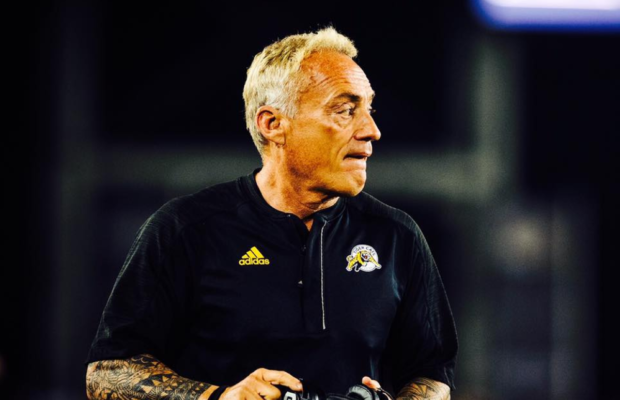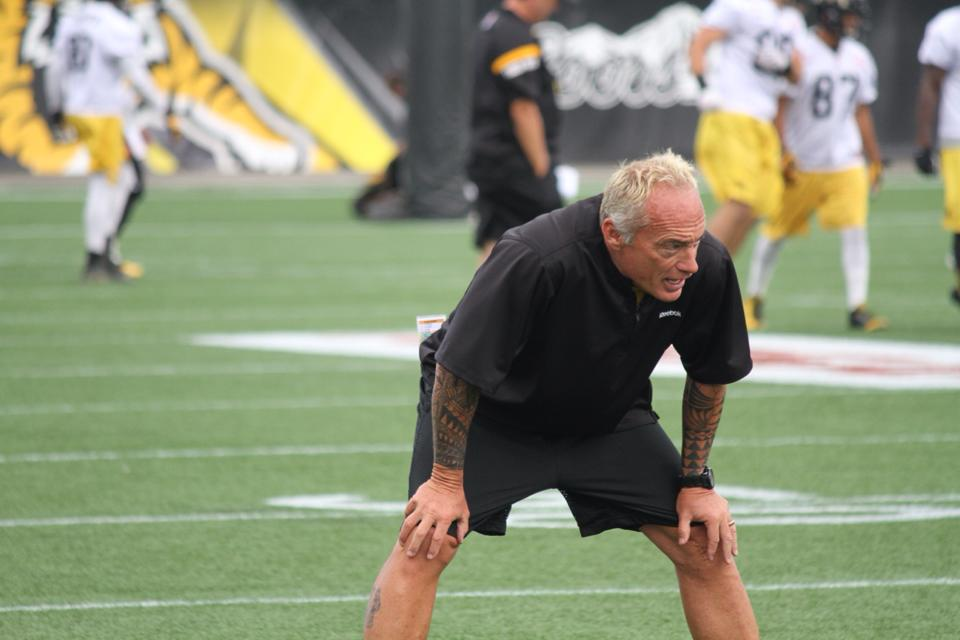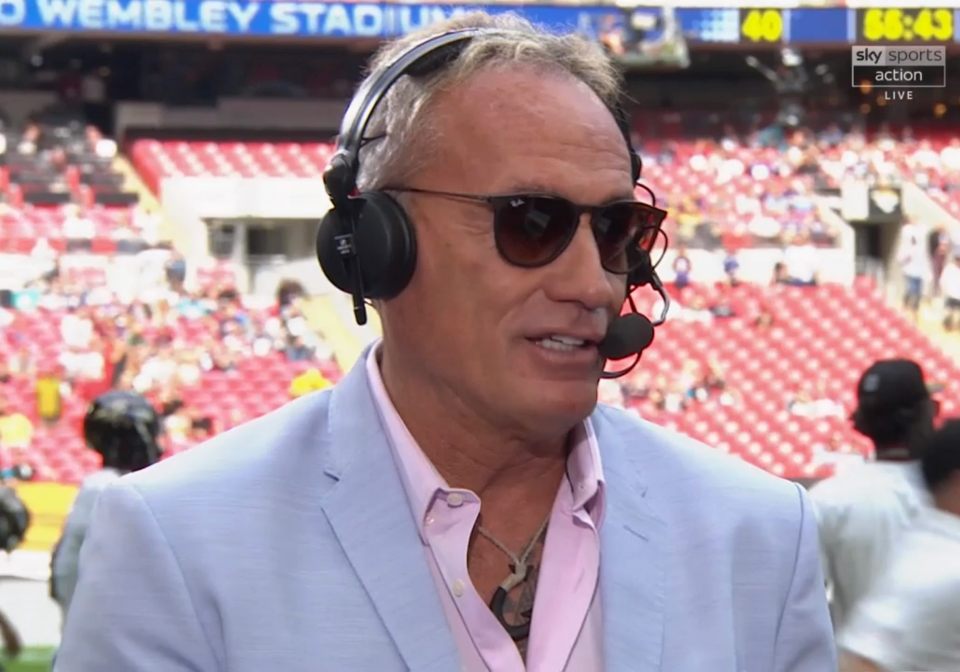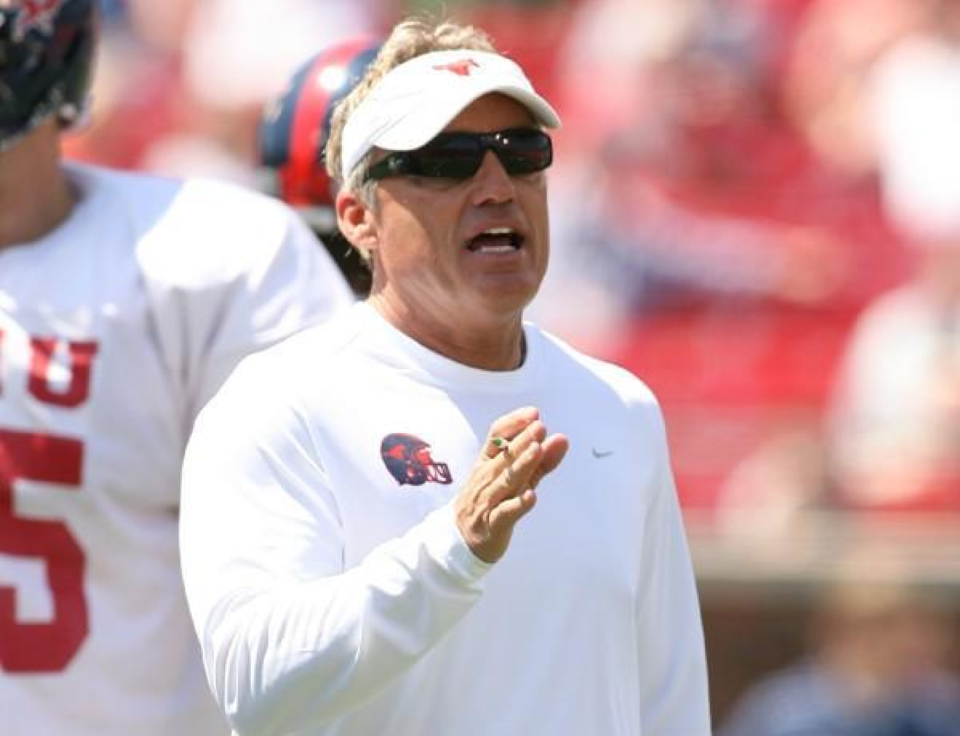Colorful CFL coach Jeff Reinebold recalls his football ‘missionary work’ in NFL Europe

The future is global.
It’s a sentiment that has been expressed by every major sports league and after decades of lagging behind the rest, the game of American football is growing at an unprecedented rate internationally. More international players are playing in college than ever before, the CFL is providing opportunities for a new wave of global talent, and the NFL continues to search for its own diamonds in the rough through the International Player Pathway Program, all will viewership for both the pro and college games spikes to new heights.
The final frontier of both recruiting and scouting lays overseas, but while it’s unfamiliar territory to most, Jeff Reinebold has seen it all. As NFL’s Europe’s Senior Manager of International Player Development in 2004, the celebrated CFL coach can recall a global football landscape much different then the one seen today.
“Football in Germany wasn’t developed at the time and football in England had blossomed really big in the 80s but then topped out so we were really in the process of bringing it back again,” he says of landscape that awaited the NFL’s developmental league. “The Scandinavian countries were just getting strong, Denmark was strong. It differed from country to country.”
Looking back more than a decade after it’s downfall in 2007, NFL Europe has left an indelible mark on the landscape of international football and Reinebold was right on the forefront. Though the league was started as the World League of American Football in 1991-92, Reinebold was first exposed to the international experiment as special teams coordinator for the Rhein Fire during their 1995 rebirth under the NFL name. Over the course of the next decade, Reinebold would be in and out of the league, again coaching with Rhein from 1999 to 2000, with Amsterdam from 2001 to 2003 and finally leading the scouting charge in 2004. He’s been involved with the game overseas ever since and still serves as an analyst for SkySports in the UK, a role he picked up while in NFL Europe.
“I believe that all of us in professional football have a responsibility to develop the game,” Reinbold says. “To grow the game, whether that’s through money, time, energy or attention. All those things are equally important.”
Most people remember the NFL’s first attempt to grow the game in Europe for it’s list of high profile alumni, household NFL names like Kurt Warner, James Harrison and Adam Vinatieri. What few people realize is the emphasis on global talent, with each team required to carry and play a handful of players born outside the U.S. and the league attempting to develop a European pathway to college football. That process of finding talented diamonds in the rough and shaping them into football prospects eventually fell to Reinebold at the request of British football legend Tony Allen, a challenging task that he relished.
“It was like missionary work,” he laughs.
Over the course of 15 years, NFL Europe would employ players from all over the continent, as well as Mexico and eventually Japan. The quality of international coaching varied greatly and was significantly behind what it is today, so the process of getting raw athletes up to speed was a continual challenge.
“I did this study with the NFL where I compared practice and competition opportunities for an athlete in the United States to an athlete in one of the more highly developed countries like Germany,” Reinebold explains. “At that time, they would have to play in the local amateur program for 25 years before they would match the opportunities afforded to an American kid just through his college career.”
Development was a process, but Reinebold believes the results speak for themselves. His tenure helped produce 32 players on NFL practice rosters and grew some into established NFL stars and Super Bowl champions. Reinebold will never forget the day that the call about a 17-year old swimmer that had followed his friend to a Dusseldorf Panthers practice reached his office. He took the trip down to see this big kid who could bend and there was Sebastian Vollmer, a 6’4 200 pound athlete that would one day become the second round selection of the New England Patriots.
“I remember the first time I sat down with his mother and father with his coach as the translator because his parents didn’t speak English very well,” Reinebold recalls. “I said I think Sebastian has a chance to go to America and play college football and get his education paid for. His mother looked at me like I had three heads.”
Finding Vollmer turned out to be the easy part, getting him to college was the near impossibility. As Reinbold describes it, 15 years ago college coaches simply weren’t lining up to recruit Europe.
“I have pretty good contacts in college football and I couldn’t get anyone to take a chance on him,” he laughs. “Even Indiana, where I went to school, the coach there was one of my college teammates and he said ‘Jeff, there’s no reason for us to come all the way to Dusseldorf to recruit a skinny offensive tackle, we have plenty of those here’.”
The solution was a summer camp for Europe’s elite players to attract college footballs best coaches, from Chip Kelly on down, to the other side of the world for a one stop recruiting shopping spree. The only problem was Vollmer couldn’t attend, he had a playoff game, so Reinebold rented a van and piled everyone into it to make sure the coaches saw what they were missing.
“By the end of the first quarter, all the coaches had gone off to call back to their head coaches to say ‘hey, this kid is really a good player.’,” he smirks.
Those types of recruiting events have become an annual part of the football calendar now, with groups like PPI and Europe’s Elite leading a new recruiting surge in Europe and building off the legacy of NFL Europe.
“The elite level players, the great, great ones—they’re going to find their way to the D1 schools because the talent is undeniable. With the advent of the internet and so much more shared information I think schools will always find those guys,” Reinebold says. “But it’s the next level kid, the developmental kid, the one that goes from Denmark to Michigan to get drafted in the NFL. Those schools need to go to Europe to find those guys. You’ll find a kid with no background in the sport. These kids are unspoiled by the recruiting process. These kids come and they’re hungry and they want to have an opportunity to dream a dream.”
For Reinebold, it’s about finding players with the right tools and skillset to project development, those with potentially lower floors but much higher ceilings. 25 years after he first got the chance to work with international players, the special teams coordinator for the Hamilton Tiger-Cats is still doing it as the CFL continues with it’s 2.0 Global initiative, in many ways the philosophical offspring of NFL Europe. While he is no longer involved in player identification, Reinebold has embraced Global players as a coach like few others. Mexican kicker Gabriel Amavizca-Ortiz became the first Global player to score points in the CFL under his watch and after pulling his hamstring in training camp, French defensive lineman Valentin Gnahoua developed in to a crucial part of his special teams unit, making several big plays on the Ticats’ Grey Cup run. Still, many of the challenges for global players without top level college experience remain the same as the were in the early 2000s.
“It took Valentin six weeks after pulling his hamstring to emotionally, physically compete at this level. It’s not as easy as taking international players and making a program. You have to educate them. It’s a full-time job preparing them for training camp,” Reinebold explains. “What they experience in training camp, they’ve never seen anything even remotely similar, even at the best programs. It’s not anything near the speed, the intensity, the amount of learning, the pressure, or the contact level—all of it, is a step up for them. They can do it but they need help. Coaching. Time and opportunities.”
Reinebold thinks the CFL was on the right track with it’s next crop of global prospects before the pandemic derailed things and necessitated more investment at home. The problems they are attempting to figure out in partnership with international federations are many of the same ones that once vexed him.
“First, you’ve got to know where to look and second, you’ve got to know the politics. Every federation is different. This is one of the things the CFL is learning as we go through this process,” Reinebold says. “In the NFL, we would get push back from some federations because they don’t want to lose their best players. They care about the success of their national teams. It can even affect their funding. We had to learn that the hard way.”
Nevertheless, Reinebold marvels at how far international football has come and the amount of talent that is out there. He is simply happy to have played a small part in laying the foundation.
“It was wonderful to watch the whole genesis of the football community in Europe and around the world blossom. It was an outstanding experience. I loved every minute of it,” Reinbold says. “I really had tremendous admiration and respect for the kids. So many of them had come up from their local sports programs and junior football. To recognize how little they had, how un-spoiled they were and how grateful they were for everything—it was such a great program to be a part of.”


